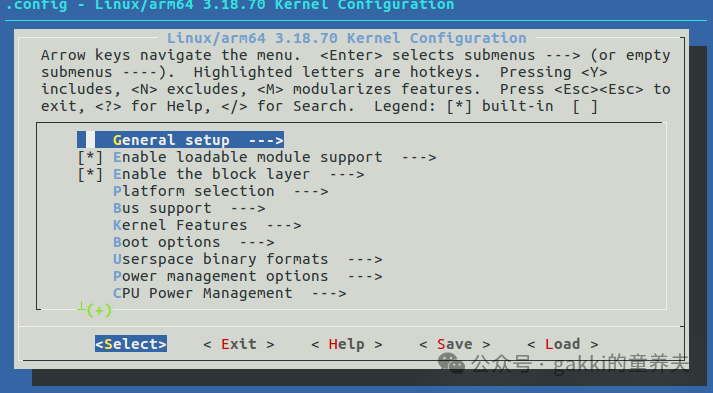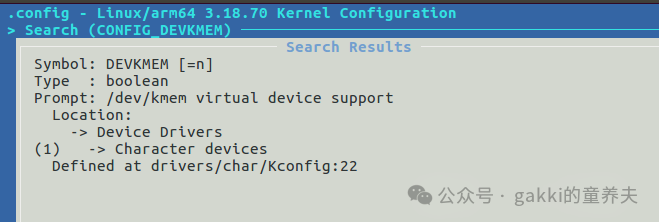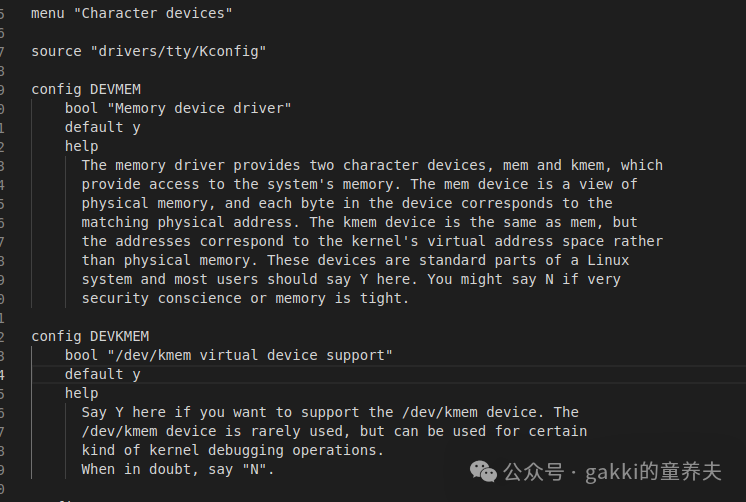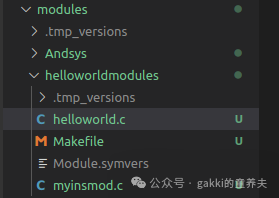

AOSP源码定制-内核驱动编写
介绍
有时候为了分析一些壳的检测,需要在内核层面对读写相关的操作进行监控,每次去修改对应的内核源码编译重刷过于耗时耗力,这里就来尝试编写一个内核驱动,载入后监控读写。
前提
已经同步对应版本的内核源码并编译,这里不赘述。
真机测试并root。
开启配置
比起直接改源码,编译模块载入模块,不需要反复修改源码并刷入内核,相比较用frida等框架更不容易检测(就是因为frida检测才用这个)。
先为编译配置开启内核可加载、卸载等选项:
CONFIG_MODULES=Y
CONFIG_STRICT_MEMORY_RWX=N / CONFIG_DEBUG_RODATA=N
CONFIG_DEVMEM=Y
CONFIG_DEVKMEM=Y
CONFIG_KALLSYMS=Y
CONFIG_KALLSYMS_ALL=Y
CONFIG_HAVE_KPROBES=Y
CONFIG_HAVE_KRETPROBES=Y
CONFIG_HAVE_FUNCTION_TRACER=Y
CONFIG_HAVE_FUNCTION_GRAPH_TRACER=Y
CONFIG_TRACING=Y
CONFIG_FTRACE=Y
在内核源码目录下执行命令(前面编译过一次,会有导入过系统变量):
make menuconfig
然后出现一个图像化的配置页面。

通过"/",打开搜索页面,查找上面对应的配置所在位置,以CONFIG_DEVKMEM为例,可以看到会给出定义路径。
去对应路径找到这个目录,drivers/char/Kconfig。
找到定义的位置,改成y即可。按照配置改好,重新编译内核,后面就可以开始编写驱动模块了
编译第一个内核驱动
这里我们编译一个内核模块有两种模式,一种是直接编译进内核,另一种是编译成单独的ko文件通过insmod,rmmod命令来加载与卸载。这里我们讲的是单独编译成ko文件。 在内核目录下创建一个modules目录,用于存放编写各类驱动模块。 先来写个helloworld模块进行测试。
简单加个代码测试,驱动代码编写有格式规范:
#include
#include
#include
static int __init hello_init(void){
printk(KERN_ALERT "Hello World! ");
return 0;
}
static void __exit hello_exit(void){
printk(KERN_ALERT "Bye ");
}
module_init(hello_init);
module_exit(hello_exit);
编写Makefile:
# 设置内核源码编译的输出目录
KERNEL_OUT=/home/fukuyama/sourceCode/msm/out
# 设置arm64交叉编译链工具路径
TOOLCHAIN=/home/fukuyama/sourceCode/Android8/prebuilts/gcc/linux-x86/aarch64/aarch64-linux-android-4.9/bin/aarch64-linux-android-
# 设置arm32交叉编译链工具路径
TOOLCHAIN32=/home/fukuyama/sourceCode/Android8/prebuilts/gcc/linux-x86/arm/arm-linux-androideabi-4.9/bin/arm-linux-androideabi-
# 设置模块
obj-m := helloworld.o
# 编译命令配置
all:
make ARCH=arm64 CROSS_COMPILE_ARM32=$(TOOLCHAIN32) CROSS_COMPILE=$(TOOLCHAIN) -C $(KERNEL_OUT) M=$(shell pwd) modules
# 清理编译命令
clean:
make -C $(KERNEL_OUT) M=$(shell pwd) cleancd
直接make编译:

编译完后,adb 推送到 data/local/tmp目录,然后insmod执行模块查看内核日志输出即可:
可以看到已经有输出了,卸载模块也有输出,证明模块已经生效了。
编写监控模块
比如要监控open和read,我们需要获取到syscalltable的基址。
echo 0 > /proc/sys/kernel/kptr_restrict
cat /proc/kallsyms

然后编写代码,增加了uid大于10000筛选:
#include "linux/kernel.h"
#include "linux/init.h"
#include "linux/module.h"
#include "linux/moduleparam.h"
#include "asm/unistd.h"
#include "linux/slab.h"
#include "linux/sched.h"
#include "linux/uaccess.h"
#include
void ** sys_call_table64 = (void**)0xffffffc001000000;
#define SURPRESS_WARNING __attribute__((unused))
#define LL unsigned long long
// int mm_uid = 10067;
// module_param(mm_uid, int, 0664);
SURPRESS_WARNING int getCurrentPid(void)
{
int pid = get_current()->pid;
return pid;
}
SURPRESS_WARNING LL isUserPid(void)
{
const struct cred * m_cred = current_cred();
kuid_t uid = m_cred->uid;
int m_uid = uid.val;
if(m_uid >10000)
{
return true;
}
return false;
}
SURPRESS_WARNING asmlinkage LL (*old_openat64)(int dirfd, const char __user* pathname, int flags, umode_t modex);
SURPRESS_WARNING LL new_openat64(int dirfd, const char __user* pathname, int flags, umode_t modex)
{
const struct cred * m_cred = current_cred();
kuid_t uid = m_cred->uid;
int m_uid = uid.val;
LL ret = -1;
ret = old_openat64(dirfd, pathname, flags, modex);
if(isUserPid())
{
char bufname[256] = {0};
strncpy_from_user(bufname, pathname, 255);
if(strstr("/sdcard/trace.txt",bufname)){
}else{
printk("myLog::openat64 pathname:[%s] ret:[%llu] current->pid:[%d] current->uid:[%d] ", bufname,ret , getCurrentPid(),m_uid);
}
}
return ret;
}
SURPRESS_WARNING asmlinkage LL (*old_read)(unsigned int fd, char __user *buf, size_t count);
SURPRESS_WARNING LL new_read(unsigned int fd, char __user *buf, size_t count)
{
const struct cred * m_cred = current_cred();
kuid_t uid = m_cred->uid;
int m_uid = uid.val;
LL ret = -1;
ret = old_read(fd, buf, count);
if(isUserPid())
{
char bufname[256] = {0};
strncpy_from_user(bufname, buf, 24);
printk("myLog::read fd:[%d] context:[%s] current->pid:[%d] current->uid:[%d] ", fd,bufname, getCurrentPid(),m_uid);
}
return ret;
}
SURPRESS_WARNING int hook_init(void){
printk("myLog::hook init success ");
if(sys_call_table64){
old_openat64 = (void*)(sys_call_table64[__NR_openat]);
printk("myLog::old_openat64 : %p ", old_openat64);
sys_call_table64[__NR_openat] = (void*)new_openat64;
old_read = (void*)(sys_call_table64[__NR_read]);
printk("myLog::old_read : %p ", old_read);
sys_call_table64[__NR_read] = (void*)new_read;
printk("myLog::hook init end ");
}
else{
printk("mylog::fail to find sys_call_table ");
}
return 0;
}
int __init myInit(void){
printk("myLog::hooksyscall Loaded1 ");
hook_init();
return 0;
}
void __exit myExit(void){
if(sys_call_table64){
printk("myLog::cleanup start ");
sys_call_table64[__NR_openat] = (void*)old_openat64;
sys_call_table64[__NR_read] = (void*)old_read;
printk("myLog::cleanup finish ");
}
printk("myLog::hooksyscall Quited ");
}
module_init(myInit);
module_exit(myExit);
载入后查看效果:
已经有监控输出了。 为了对上面的监控更加细化,修改补充一部分uid的限制:
......
void ** sys_call_table64 = (void**)0xffffffc001000000;
#define SURPRESS_WARNING __attribute__((unused))
#define LL unsigned long long
int mm_uid = 10067;
module_param(mm_uid, int, 0664);
......
SURPRESS_WARNING LL isUserPid(void)
{
const struct cred * m_cred = current_cred();
kuid_t uid = m_cred->uid;
int m_uid = uid.val;
if(m_uid == mm_uid)
{
return true;
}
return false;
}
在启动模块的时候,增加启动参数,只打印对应uid的app读写监控。
insmod helloworld.ko mm_uid=10067
演示略。 只是这个模块好像卸载的时候会死机重启。
总结
简单学习下内核驱动的编写与加载,简化内核监控,还可以补充定制用于绕过一些反调试。
全部0条评论

快来发表一下你的评论吧 !
